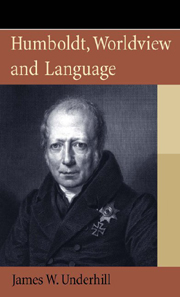Book contents
- Frontmatter
- Contents
- Acknowledgements
- Preface
- Part I Language and World
- Part II Humboldt, Man and Language
- 7 Worldview (Weltanschauung or Weltansicht)
- 8 Sprache
- 9 The Work of the Mind
- 10 Form
- 11 Creativity, Culture and Character
- 12 Catching the Character
- 13 A Seeing and Feeling Worldview
- 14 Four Dangers in the Comparative Approach
- 15 Reformulating the Worldview Hypothesis World
- 16 A Final Word
- Glossary
- Bibliography
- Index
12 - Catching the Character
from Part II - Humboldt, Man and Language
Published online by Cambridge University Press: 12 September 2012
- Frontmatter
- Contents
- Acknowledgements
- Preface
- Part I Language and World
- Part II Humboldt, Man and Language
- 7 Worldview (Weltanschauung or Weltansicht)
- 8 Sprache
- 9 The Work of the Mind
- 10 Form
- 11 Creativity, Culture and Character
- 12 Catching the Character
- 13 A Seeing and Feeling Worldview
- 14 Four Dangers in the Comparative Approach
- 15 Reformulating the Worldview Hypothesis World
- 16 A Final Word
- Glossary
- Bibliography
- Index
Summary
The project that Humboldt was outlining at the time of his death for the study of the individual characters of nations and languages in all their kaleidoscopic variety is an exciting and daunting one. Who can hope to master the world's languages (or even a handful of them) to a degree of competence sufficient to allow him to compare them in any meaningful way? Even the question proves problematic. What do we mean by mastering a language? What do we mean by meaningfully comparing languages? The idea of mastering a language is usually reserved for foreigners and children who reach a certain stage of linguistic competence which is generally agreed to be acceptable. At this stage, the speaker is said to communicate meaningfully while respecting the grammar of the language. But does such a stage of linguistic competence allow the speaker to appreciate fully the worldview of the language?
Much comparative linguistics of the second half of the twentieth century was fuelled by the desire to map languages. Those who embarked upon the mapping of languages quite simply abandoned the search for meaning in language. Language was reduced to form (in the grammatical sense) and grammars were classified and catalogued. This attempt to map languages aimed only at what might be called a formal understanding of them. Formal understanding was something that Hegel criticised in the Enlightenment's project to establish scientific knowledge.
- Type
- Chapter
- Information
- Humboldt Worldview and Language , pp. 97 - 105Publisher: Edinburgh University PressPrint publication year: 2009



